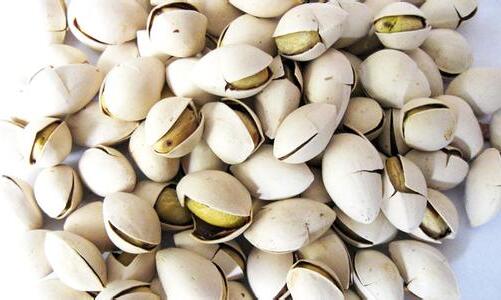Distribution﹕
Throughout China, from temperate zone to subtropical zone and some parts of north America. In the subtropical zone, usually they are found in the higher altitude where the climate is cooler.
Parts Being Used﹕
Traditionally, seeds were used. Now leaves are also being used for making extracts.
Characteristics﹕
Sweet, bitter, astringent, neutral, mildly toxic and very toxic for children.
In the classical text of "Ben Cao Pin Hui Jing Yao" it states that the characteristics of the leaves of yin xing are bitter sweet, astringent, neutral. and belong to the lung meridian and can control the lungs and calm asthma, calm the mind and arrest pain, rid of water retention and stop diarrhea.
Channel (meridian) relation﹕
Nuts: kidney, lung
Leaves: lung
Actions & Indications﹕
Uses of bai guo nuts:
As a tonic. Lowers sludge level in blood. Expels phlegm and stops wheezing cough. Eliminates damp heat, dampness and stops vaginal discharge in yeast infection. For incontinence, Nocturnal Emission, Prostatitis, Prostatic Hyperplasia.
Uses of extract of ginkgo leaves:
cardiovascular diseases and diseases of the blood vessels of the brain: Angina, Arrhythmia, ischemia of the brain, edema of the brain, hardening of the brain arteries, brain infarction, high viscosity of blood, high blood lipids, high cholesterol, claudication, arterial embolization, plebitis, vein dysfunction etc.

Neurological diseases: premature senility, vascular dementia, memory impairment, aphasia, reading difficulty, Parkinson's Disease, swallowing disorder after stroke, vestibular disorder, para-sympathetic nervous system disorder, dizziness, vascular type of headache, anxiety, depression, stress, ect.
Meniere's Disease,Tinnitus, optical neuropathy, disease of the retina, macular degeneration, diabetic retinopathy, retina arterial sclerosis.
Diseases of the respiratory system: Chronic Bronchitis, TB, baby pneumonia, respiratory tract syncytial virus pneumonia (pneumoviridae), bronchopneumonia (capillary bronchitis), children chronic bronchitis, children asthmatic diseases.
Diseases of the urinary tract: urolithiasis (stone) incontinence, frequent urination.
Medical functions:
1. Effect on Respiratory System
2. Effect on Smooth Muscles
3. Effect on Circulatory System
4. Effect on Brain Circulation
5. Effect on Free Radicals
6. Effect of Anti Bacteria
Present Day Applications:
1. Labyrinthine syndrome
2. Pimples
3. Urolithiasis (formation of calculi in the urinary tract.)
Formulae: root of gingko biloba 120 g, rock cane sugar 120 g. Boil with water. Taken orally. 4~5 doses a week. If there is infection of urinary track, use Ba Zheng San with bai hua she she cao. Drink plenty of liquid and excercise (editor note: preferably qigong dong gong). Out of fifty patients, thirty two were healed. Ten patients were improved. Eight patients did not improve. Average treatment time was 133 days.

![Diseases, Symptoms, tcm, [tcmwindow.com]](/uploadFile/adImg/2015/11/11/f5cbfcc0-4df5-4646-9b9a-f316651a0199.jpg)





